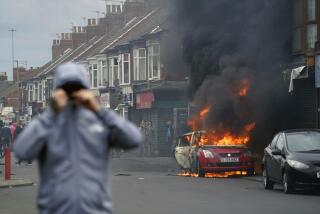Blast Shakes N. Ireland Peace Process--Perhaps to Core
- Share via
LONDON — Speaking for negotiated peace in Northern Ireland last summer, Sinn Fein President Gerry Adams was heckled in Roman Catholic west Belfast by a man who shouted, “Bring back the IRA!”
Adams replied, “They never went away, you know.”
It seems he was right.
A suspected IRA bomb that ravaged the heart of Manchester in northwest England the day before echoed Sunday as observers held out little hope for the limping peace process in the divided and bloodied British province of Northern Ireland.
At least for the short term, the bombing indicated that the Irish Republican Army is not willing to abandon violence in its search for a reunited Ireland.
Pointing to sharp differences between hard-liners who want to fight and politicians who want to talk, the blast also seriously undermined Adams and Sinn Fein as interlocutors in any democratic process.
Peace talks that opened last week in Belfast, the capital of Northern Ireland, under former U.S. Sen. George Mitchell are dead in the water, some analysts say. Hopes that Sinn Fein, the IRA’s political wing, could quickly join the talks vanished in the ugly pillar of black smoke that swirled above England’s third-largest city.
The Manchester bomb wounded more than 200 people and would surely have killed many if 75,000 shoppers and workers hadn’t been evacuated after authorities learned that an attack was imminent. It was a bloody response to almost universal appeals for peace.
Renewal of a cease-fire broken by an IRA bomb in London in February would have brought Adams and Sinn Fein to the peace table in Belfast for all-party talks that seem doomed to impotence in their absence.
Saturday’s midmorning attack brought no immediate claim of responsibility but bore several IRA trademarks.
As at the London Docklands in February, the bomb was in a truck. This time it was a 7 1/2-ton Ford van parked at the Arndale Center mall near the busiest shopping street in Britain after London’s Oxford Street. “Jack Roberts Transport” read the painted legend on the van. Evacuation of a square mile downtown came after four coded warnings in England and Ireland, another IRA hallmark.
In Sunday’s aftermath, scorn poured on the IRA.
Said the Sunday Tribune in Dublin: “The IRA has made its presence felt and told the rest of humanity on these islands that we and our peace process can go to hell.”
Sinn Fein, claiming to speak for the IRA as its political arm, has a powerful electoral mandate in Northern Ireland: It won 15% of the overall vote--and 40% of the Catholic vote--in May elections for representatives to the peace forum.
On the basis of the mandate, Adams demands entry to peace talks without conditions. Britain and Ireland, strongly supported by the United States, have insisted on an unequivocal restoration of the cease-fire by the IRA.
Now, in the bomb’s wake, even that might not be enough.
“The action indicates that Sinn Fein can neither be trusted nor believed. . . . Sinn Fein/IRA has ruled themselves out of any participation in the peace process,” said the Sunday Independent in Dublin.
*
Pro-British unionist parties demanded Sunday that Britain and Ireland ban all contacts with Sinn Fein. Andrew Hunter, the ruling Conservative Party’s Northern Ireland chairman, said: “There is no room in the negotiations for people like them, and there never will be.”
Ireland, where Prime Minister John Bruton has committed unremitting government energies and prestige to the peace process, was particularly stung by the Manchester attack and by Adams’ refusal to condemn the slaying of a police officer in County Limerick last week by the IRA.
“Obviously we are having to review very seriously and fundamentally our relationship with Sinn Fein, with the republican movement as a whole, in the light of what has happened,” Bruton said.
Adams is in trouble. If he cannot deliver the IRA and its guns to the peace table, or becomes divorced from the Army Council that calls the IRA shots, both he and Sinn Fein risk being sidelined.
Adams and other Sinn Fein leaders believe that any split in the IRA would be disastrous, but the Manchester bomb raises fundamental questions about republican unity, according to commentator David McKittrick.
“The Army Council is formally in charge, but there are increasing signs that the movement at large is looking for leadership not to the IRA but to Gerry Adams and others who lead Sinn Fein,” he said.
If prospects for the peace talks were uncertain when they opened last week, they are now dim indeed for the foreseeable future.
More to Read
Sign up for Essential California
The most important California stories and recommendations in your inbox every morning.
You may occasionally receive promotional content from the Los Angeles Times.













